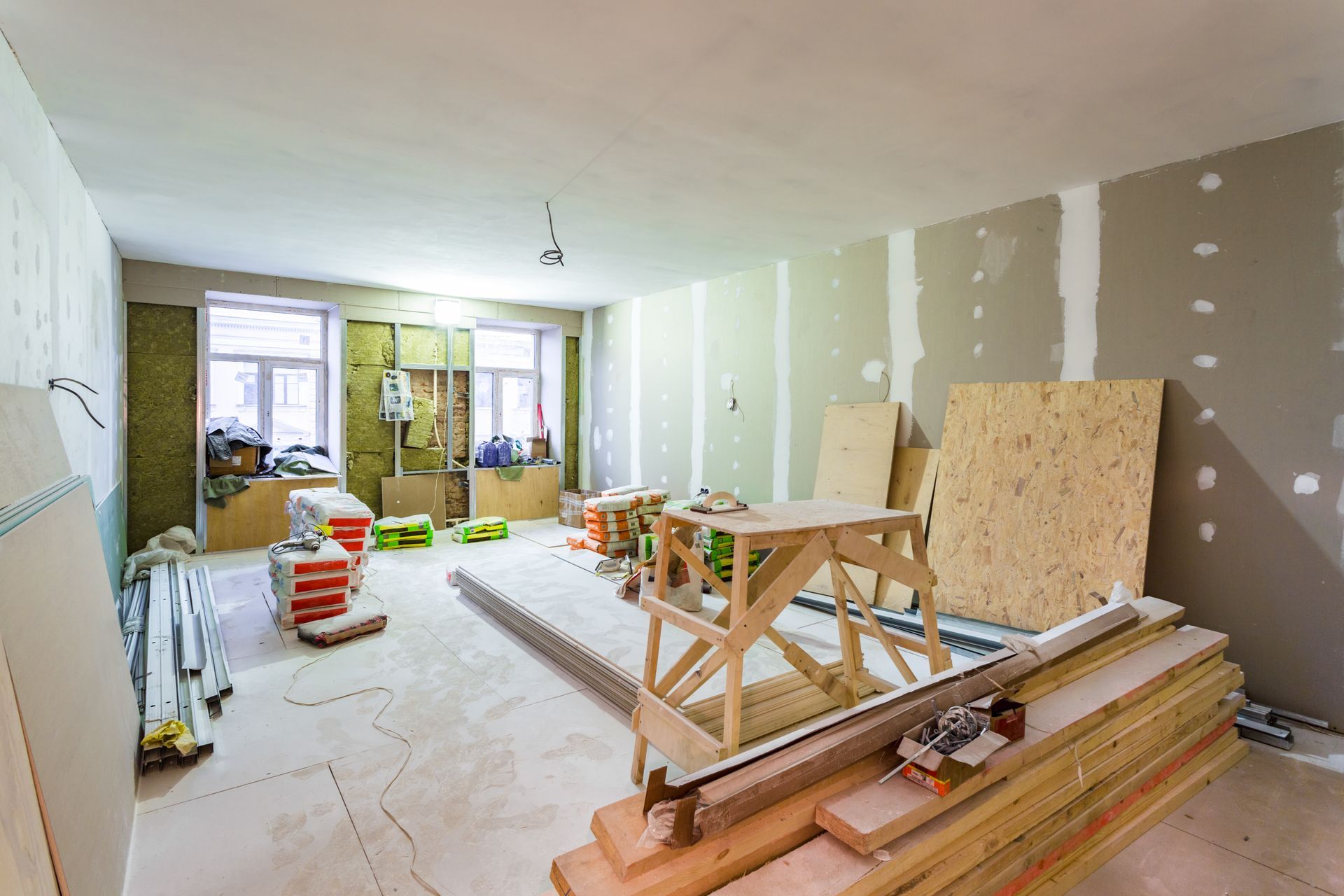Call Us
Call Us

The Ultimate Step-by-Step Guide to Planning a Successful Home Renovation
A home renovation can improve your living space, boost your property’s value, and make your home more functional. But without a solid plan, it can lead to budget overruns, delays, and unexpected issues. Proper planning helps you stay in control, avoid costly mistakes, and get the results you want.
A well-structured renovation plan keeps your budget on track, ensures legal compliance, and prevents unnecessary setbacks. It also helps you decide what changes add the most value and how to prioritize tasks. Whether you're remodeling a single room or upgrading your entire home, taking the right approach will save you time, money, and stress.
For a detailed look at home renovation services, check out our Comprehensive Guide to Home Renovation Services.
Define Your Home Renovation Goals
Before starting a renovation, clarify what you want to achieve. Without a clear plan, you might spend money on changes that don’t align with your needs or long-term goals. Start by identifying your must-haves, nice-to-haves, and future-proofing opportunities.
Identify Needs vs. Wants
Think about why you're renovating. Are you fixing structural issues, modernizing outdated spaces, or improving functionality? Prioritize essential upgrades over aesthetic changes. For example, replacing faulty wiring is a necessity, while adding high-end finishes is optional. Sorting these priorities keeps your budget in check and prevents unnecessary spending.
Consider Future-Proofing
A well-planned renovation adds long-term value. If you plan to stay in your home for years, think about energy-efficient upgrades, smart home technology, and durable materials. If resale value matters, focus on projects that increase buyer appeal, like kitchen remodels or updated bathrooms.
Align with Your Lifestyle
Your home should match the way you live. Do you need an open-concept layout for entertaining, a home office for remote work, or extra storage for a growing family? Renovate with your lifestyle in mind so your investment pays off in both comfort and functionality.
Set a Realistic Budget
A successful home renovation starts with a clear and realistic budget. Without one, costs can quickly spiral out of control, leading to financial stress and unfinished projects. Setting a budget helps you prioritize expenses, control spending, and avoid surprises.
Breakdown of Costs
Renovation costs vary depending on the scope of work, materials, and labor. A good budget should account for:
- Materials – Flooring, fixtures, paint, cabinetry, and finishes.
- Labor – Contractor fees, subcontractors, and specialized trades.
- Permits and Inspections – Required for structural, electrical, and plumbing work.
- Unexpected Expenses – Hidden issues like water damage or outdated wiring.
Hidden Costs to Watch Out For
Many homeowners underestimate costs because they don’t factor in hidden expenses. Some common overlooked costs include:
- Structural repairs – Old homes may need foundation work or reinforcement.
- Utility upgrades – Older homes may require electrical or plumbing upgrades.
- Change orders – Mid-project design changes can increase costs.
Budgeting Tips
- Set aside 10–20% extra for unexpected expenses.
- Get multiple quotes from contractors to compare pricing.
- Avoid high-end upgrades unless they add real value to your home.
- Consider phased renovations if your budget doesn’t allow for everything at once.
Financing Options
If you don’t have enough savings for your renovation, financing options can help:
- Home equity loans – Borrow against your home’s value.
- Personal loans – Best for smaller projects with quick repayment plans.
- Renovation mortgages – Include remodeling costs in a home loan.
A well-planned budget keeps your renovation on track without financial stress. Knowing your numbers before you start prevents overspending and keeps you in control.
Create a Detailed Home Renovation Plan
A successful renovation requires more than just a budget—you need a clear plan. Without one, your project can face delays, unexpected costs, and last-minute design changes. A well-structured plan keeps everything organized, on schedule, and within budget.
Prioritize Projects
Not all renovations need to happen at once. Start with the most essential upgrades and work your way down. Prioritization depends on:
- Structural and safety concerns – Foundation repairs, roof replacements, electrical upgrades.
- High-impact areas – Kitchens and bathrooms add the most value.
- Energy efficiency – Insulation, windows, and HVAC improvements save on long-term costs.
If your budget doesn’t cover everything, consider a phased approach, completing one section at a time.
Estimate Your Timeline
Renovation timelines vary based on project size and contractor availability. Here’s a general breakdown:
- Minor updates (painting, flooring, light fixtures): 1–3 weeks
- Kitchen or bathroom remodel: 4–12 weeks
- Whole-house renovation: 3–12+ months
Factor in possible delays due to permits, material shortages, or weather conditions. Having a realistic timeline helps you plan living arrangements and avoid frustration.
Gather Inspiration and Define Your Vision
Before starting, know what you want. Use resources like:
- Home improvement websites and renovation blogs.
- Pinterest and Instagram for visual inspiration.
- Showrooms and home expos to see materials in person.
Creating a mood board or design plan helps contractors understand your vision, reducing miscommunication and last-minute changes.
A detailed plan ensures smooth execution, fewer surprises, and a stress-free renovation. The more prepared you are, the easier it is to stick to your timeline and budget.
Research and Hire the Right Contractors
Hiring the right contractor is one of the most important decisions in your renovation. A skilled professional ensures
quality work, avoids costly mistakes, and keeps the project on schedule. But choosing the wrong one can lead to delays, subpar work, and budget overruns.
Finding Qualified Contractors
Not all contractors are equal. To find the best one for your project:
- Ask for recommendations – Friends, family, and neighbors can share firsthand experiences.
- Check online reviews – Look at Google, Yelp, and contractor directories for feedback.
- Verify licenses and insurance – Ensure they are licensed, bonded, and insured to protect against liability.
- Review past work – Ask for a portfolio or visit completed projects if possible.
Comparing Estimates
Always get at least three quotes before hiring. A good estimate should include:
- Detailed cost breakdown – Materials, labor, and additional fees.
- Timeline expectations – Start and completion dates.
- Payment schedule – Avoid large upfront payments; staged payments are safer.
Be wary of lowball offers—they may indicate inexperience or hidden fees down the road.
Contracts and Agreements
Never start work without a written contract. It should include:
- Scope of work – What’s included and what’s not.
- Project timeline – Start date, milestones, and expected completion date.
- Cost breakdown and payment terms – Avoid vague pricing.
- Warranty and dispute resolution – Coverage for workmanship and handling disagreements.
A clear contract protects both you and the contractor, ensuring expectations are set from the start.
DIY vs. Professional Work
Some projects can be DIY-friendly, but others require professional expertise. Consider hiring a pro for:
- Electrical and plumbing work – Safety and code compliance are critical.
- Structural changes – Removing walls or foundation work needs engineering knowledge.
- High-end finishes – Precision matters in cabinetry, tiling, and stonework.
A great contractor makes all the difference in a renovation. Do your research, compare options, and never rush the hiring process.
Obtain Permits and Understand Local Regulations
Skipping permits or ignoring building codes can lead to fines, delays, and even having to redo work. Many homeowners overlook this step, but it’s essential to ensure your renovation is legal, safe, and up to code.
Why Permits Matter
Permits protect homeowners by ensuring the work meets safety standards and local regulations. Without proper permits, you might face:
- Fines and penalties – Cities can issue costly violations for unapproved work.
- Delays in selling your home – Unpermitted renovations can cause problems during inspections.
- Safety hazards – Electrical, plumbing, and structural work must meet safety codes.
What Requires a Permit?
Permit requirements vary by location, but common renovations that need permits include:
- Structural changes – Removing walls, adding rooms, or modifying load-bearing elements.
- Plumbing and electrical work – Installing new wiring, upgrading electrical panels, or adding plumbing lines.
- HVAC installations – Replacing furnaces, adding central air, or modifying ventilation systems.
- Major renovations – Kitchen remodels, bathroom remodels, and basement finishing often require permits.
Small updates like painting, flooring, or replacing cabinets typically
do not require a permit. However, always check with your local building department to confirm.
How to Apply for Permits
The permitting process varies, but it generally includes:
- Submitting an application – Provide project details and blueprints if needed.
- Paying fees – Costs depend on the project size and location.
- Getting an inspection – Officials may inspect the work at different stages.
- Receiving final approval – Once everything meets code, you’ll get a completion certificate.
Work with a Contractor Who Handles Permits
Experienced contractors know the permitting process and handle approvals for you. If you’re hiring a professional, confirm that they will secure the necessary permits and follow code requirements.
Skipping permits might seem like a way to save time and money, but it can cost you more in the long run. Always follow local regulations to protect your investment.
Prepare Your Home for Renovation
Renovations can be messy and disruptive, but proper preparation makes the process smoother. Whether you’re staying in your home or temporarily relocating, getting your space ready helps prevent damage, minimize stress, and keep the project on track.
Decide on Living Arrangements
Some renovations allow you to stay home, but others may require you to leave for a while. Consider:
- Minor projects (painting, flooring, small upgrades): You can likely stay home with minimal inconvenience.
- Major renovations (kitchen remodel, bathroom remodel, full-home renovation): You may need to find temporary housing, especially if utilities will be shut off.
- Projects affecting daily life (dust, noise, strong odors): If you work from home or have kids or pets, consider alternate living arrangements.
Protect Furniture and Belongings
Construction dust gets everywhere. To protect your home:
- Move valuables and fragile items to a safe location.
- Cover furniture and floors with plastic sheets or drop cloths.
- Seal off rooms not under renovation to prevent dust from spreading.
- Store essentials in an accessible place if the kitchen or bathroom will be unusable.
Prepare for Noise and Disruptions
Renovations bring loud noise, foot traffic, and unexpected interruptions.
- Communicate with neighbors if work will be noisy.
- Plan your daily routine around work schedules to avoid frustration.
- Set up temporary spaces (e.g., a mini kitchen with a microwave and fridge if your kitchen is being remodeled).
The more you prepare, the easier it will be to live through the renovation without unnecessary stress. Taking these steps protects your belongings and helps contractors work efficiently.
Manage the Renovation Process Efficiently
Even with a solid plan, renovations rarely go exactly as expected. Managing the process effectively helps you stay on budget, minimize delays, and ensure quality work. Regular communication with your contractor and staying involved will make a big difference.
Stay in Regular Contact with Your Contractor
Contractors handle the technical work, but you should stay informed and involved.
- Schedule regular check-ins – Weekly updates keep you in the loop.
- Ask for progress reports – Photos, walkthroughs, or updates help track milestones.
- Address concerns immediately – Don’t wait until the end to bring up issues.
A good contractor will communicate clearly, but you should also be proactive to prevent misunderstandings.
Track Progress and Stick to the Timeline
Unexpected delays happen, but a well-managed project stays close to the original schedule.
- Follow the project timeline – Know what’s supposed to happen each week.
- Check for material delays – Backordered items can push the timeline back.
- Avoid excessive changes – Design changes mid-project often cause costly delays.
Having a
detailed renovation calendar helps you stay organized and keeps the project moving forward.
Handle Unexpected Issues
Even with the best planning, problems can arise. Common surprises include:
- Hidden structural issues – Old wiring, plumbing problems, or water damage.
- Permit or inspection delays – City approvals can take longer than expected.
- Material shortages – Supply chain issues can slow down deliveries.
The best way to manage setbacks is to stay flexible, trust your contractor’s expertise, and have contingency funds in place. A well-managed renovation keeps stress low and ensures you get the results you want.
Final Inspections and Project Completion
Before signing off on your renovation, take the time to
inspect the work, address any issues, and ensure everything meets expectations. Rushing this step could leave you with unfinished details or costly repairs later.
Conduct a Walkthrough with Your Contractor
Schedule a final walkthrough with your contractor to review every part of the project. Look for:
- Quality of workmanship – Check for uneven paint, gaps in trim, or misaligned fixtures.
- Functionality – Test outlets, light switches, faucets, and appliances.
- Safety compliance – Ensure smoke detectors, ventilation, and electrical work meet local codes.
Create a Punch List for Final Fixes
A punch list is a detailed list of small fixes or touch-ups that need to be completed before final payment. Common items include:
- Patching drywall imperfections.
- Fixing misaligned doors or cabinets.
- Adjusting uneven flooring or tiles.
- Replacing damaged materials.
Contractors usually complete punch list items
before the final payment is released. Don’t sign off until everything is finished to your satisfaction.
Collect Warranties and Documentation
Ask your contractor for:
- Warranties on labor and materials – These protect against defects.
- Maintenance instructions – Learn how to care for new fixtures and finishes.
- Permit approvals and inspection reports – Keep these for future reference, especially if selling your home.
A proper final inspection ensures your renovation meets expectations and avoids lingering issues. Once everything checks out, you can officially enjoy your newly renovated home.
Enjoy Your Newly Renovated Home
A well-planned renovation doesn’t just improve your home—it enhances your lifestyle. Whether you upgraded your kitchen, remodeled a bathroom, or tackled a full-scale renovation, the effort you put into planning ensures lasting quality and value.
Work with a Trusted Renovation Expert
If you're ready to start your home renovation, partner with a contractor who delivers expert craftsmanship and reliable service. VX2 Contracting specializes in:
- Drywall & Framing – High-quality installation for smooth, durable walls.
- Steel Studs & Acoustic Ceilings – Commercial-grade solutions for soundproofing and stability.
- Bathroom & Kitchen Remodeling – Transform your space with expert design and installation.
Serving South Central PA, including Harrisburg, Hershey, Gettysburg, Lancaster, York, Reading, and Chambersburg, VX2 Contracting provides professional renovation services tailored to your needs.
Ready to start your home transformation? Contact VX2 Contracting today for a consultation and get expert guidance on your next project.
You might also like
OUR SERVICES
All Rights Reserved | LocalEyes


